John Locke is known the father of Liberal Democracy, basis of western constitutional democracy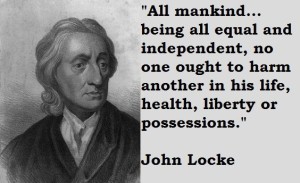 . He was from a puritan family and he lived during the time of Hobbes. He believed that Men being, as has been said, by nature, all free, equal, and independent, no one can be put out of this state, and subjected to the political power of another, without his own consent. the only way whereby anyone divests himself of his natural liberty, and puts on the bonds of civil society, is by agreeing with other men to join and unite into a community for their comfortable, safe , and peaceable living one amongst another, in a secure enjoyment of their properties, and a greater security against any, that are not of it.
. He was from a puritan family and he lived during the time of Hobbes. He believed that Men being, as has been said, by nature, all free, equal, and independent, no one can be put out of this state, and subjected to the political power of another, without his own consent. the only way whereby anyone divests himself of his natural liberty, and puts on the bonds of civil society, is by agreeing with other men to join and unite into a community for their comfortable, safe , and peaceable living one amongst another, in a secure enjoyment of their properties, and a greater security against any, that are not of it.
 . He was from a puritan family and he lived during the time of Hobbes. He believed that Men being, as has been said, by nature, all free, equal, and independent, no one can be put out of this state, and subjected to the political power of another, without his own consent. the only way whereby anyone divests himself of his natural liberty, and puts on the bonds of civil society, is by agreeing with other men to join and unite into a community for their comfortable, safe , and peaceable living one amongst another, in a secure enjoyment of their properties, and a greater security against any, that are not of it.
. He was from a puritan family and he lived during the time of Hobbes. He believed that Men being, as has been said, by nature, all free, equal, and independent, no one can be put out of this state, and subjected to the political power of another, without his own consent. the only way whereby anyone divests himself of his natural liberty, and puts on the bonds of civil society, is by agreeing with other men to join and unite into a community for their comfortable, safe , and peaceable living one amongst another, in a secure enjoyment of their properties, and a greater security against any, that are not of it. Locke liked Descartes’ method of clearing the slate to find out how people got to know things. But human reason wasn’t the answer that Locke came up with. He said that all knowledge begins with what comes to the mind through the senses. Only then can people begin to organize this information through reason. He said that no -one knows anything at birth. “The mind is a blank piece of paper.”
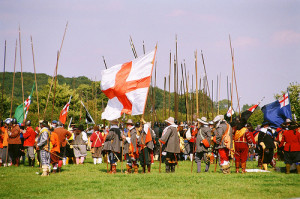 When Locke was a boy, there was a civil war between the king and the parliament. The King’s supporters lost the war. Locke grew up during England’s civil war. His father fought for parliament against the king. The local member of parliament thanked him by sending young John to an exclusive school. This lucky quirk of fate set Locke on the road to a glittering future.
When Locke was a boy, there was a civil war between the king and the parliament. The King’s supporters lost the war. Locke grew up during England’s civil war. His father fought for parliament against the king. The local member of parliament thanked him by sending young John to an exclusive school. This lucky quirk of fate set Locke on the road to a glittering future.Locke became interested in medicine at Oxford University. He studied medicine part-time and became well qualified. He also rubbed shoulders with lots of famous people. He was a lecturer at Oxford university and his friend Isaac Newton discovered gravity. The most powerful was lord Shaftesbury, who made Locke his personal secretary and doctor. When an abscessed liver threatened to kill Shaftesbury, Locke operated on the his diseased liver and fitted it with a silver tap.
Shaftesbury rose to Lord Chancellor, and he made Locke a government minister. But Shaftesbury’s intrigues get them both into trouble with CHarles II, the newly reinstated king. Locke was a careful man, however. He wrote his notes in code and crossed out names and places. He even used invisible ink with which he wrote romantic letters to his many lady friends, though he never married. The king’s spies reported that Locke lived “very cunning and unintelligible life”.
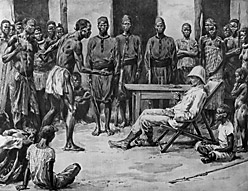 The dog-eat-dog political arena convinced Locke of the need for tolerance. He said that all people had these basic rights: The right to life , to freedom, to own property, and revolt against unjust rule. One of the prominent Locke’s legacy is that American Constitution embodies Locke’s political Idea. Locke is the only philosopher in England to have become a minister of government, But it is ironic that the philosopher who believed that people were equal because nature made them free, he was in charge of England’s lucrative slave trade.
The dog-eat-dog political arena convinced Locke of the need for tolerance. He said that all people had these basic rights: The right to life , to freedom, to own property, and revolt against unjust rule. One of the prominent Locke’s legacy is that American Constitution embodies Locke’s political Idea. Locke is the only philosopher in England to have become a minister of government, But it is ironic that the philosopher who believed that people were equal because nature made them free, he was in charge of England’s lucrative slave trade.John Locke’s idea of Monarchy:
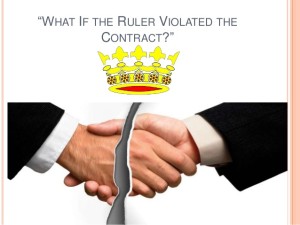 Some Scholars (such as Filmer’s Patriarcha – The natural power of king) believed the power of Monarch is a patriarchal power – like the power of a father over his children. This power is the possession of king, and can be passed on to his children. Just like God granted dominion to Adam.
Some Scholars (such as Filmer’s Patriarcha – The natural power of king) believed the power of Monarch is a patriarchal power – like the power of a father over his children. This power is the possession of king, and can be passed on to his children. Just like God granted dominion to Adam.Locke argued that paternal power is not the same as political power. Paternal power legitimate for those subjects who are not capable of reasoning – like children. For reasoning adults, power comes from consent. And consent is always limited. Rational adults would never consent to, or contract for, an absolute power over them.
Locke’s definition of the “State of nature”:
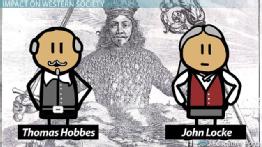 The state of nature has a law of nature to govern it, which obliges everyone: and reason, which is that low, teaches all mankind, who will but consult it, that being all equal and independent, no one ought to harm another in his life, health, liberty, or possessions: for men being all the workmanship of one omnipotent, and infinitely wise maker; all the servants of one sovereign master, sent into the world by his order, and about his business; they are his property, whose workmanship they are, made to last during his, not one another’s pleasure: and being furnished with like faculties, sharing all in one community of nature, there cannot be supposed any such subordination among us, that may authorize us to destroy one another,as if we were made for one another’s uses, as the inferior ranks of creatures are for our’s. Every one, as he is bound to preserve himself, and not to quit his station wilfully, so by the like reason, when his own preservation comes not in competition, ought he, as much as he can, to preserve the rest of mankind, and may not, unless it be to do justice on an offender, take away, or impair the life, or what tends to the preservation of the life, the liberty, health, limb, or goods of another.
The state of nature has a law of nature to govern it, which obliges everyone: and reason, which is that low, teaches all mankind, who will but consult it, that being all equal and independent, no one ought to harm another in his life, health, liberty, or possessions: for men being all the workmanship of one omnipotent, and infinitely wise maker; all the servants of one sovereign master, sent into the world by his order, and about his business; they are his property, whose workmanship they are, made to last during his, not one another’s pleasure: and being furnished with like faculties, sharing all in one community of nature, there cannot be supposed any such subordination among us, that may authorize us to destroy one another,as if we were made for one another’s uses, as the inferior ranks of creatures are for our’s. Every one, as he is bound to preserve himself, and not to quit his station wilfully, so by the like reason, when his own preservation comes not in competition, ought he, as much as he can, to preserve the rest of mankind, and may not, unless it be to do justice on an offender, take away, or impair the life, or what tends to the preservation of the life, the liberty, health, limb, or goods of another.Locke’s definition of the “State of war”:
 And hence it is that he who attempts to get another man to get another man into his absolute power does thereby put himself into a state of war with him; it being to be understand as a declaration of a design upon his life. For i have reason to conclude that he who would get me into his power without my consent would use me as he pleased when he had got me there, and destroy me too when he had a fancy to it; for nobody can desire to have me in his absolute power unless it be to compel me by force to that which is against the right of my freedom – i.e. make me a slave. To be free from such force is the only security of my preservation, and reason bids me look on him as an enemy to my preservation who would take away that freedom which is the fence to it; so that he who makes an attempt to enslave me thereby put himself into a state of war with me. He that in the State of Nature would take away the freedom that belongs to anyone in that state must necessarily be supposed to have a design to take away everything else, that freedom being the foundation of all the rest; as he that in the state of society would take away the freedom belonging to those of that society or commonwealth must be supposed to design to take away from them anything else, and so be looked on as in a state of war.
And hence it is that he who attempts to get another man to get another man into his absolute power does thereby put himself into a state of war with him; it being to be understand as a declaration of a design upon his life. For i have reason to conclude that he who would get me into his power without my consent would use me as he pleased when he had got me there, and destroy me too when he had a fancy to it; for nobody can desire to have me in his absolute power unless it be to compel me by force to that which is against the right of my freedom – i.e. make me a slave. To be free from such force is the only security of my preservation, and reason bids me look on him as an enemy to my preservation who would take away that freedom which is the fence to it; so that he who makes an attempt to enslave me thereby put himself into a state of war with me. He that in the State of Nature would take away the freedom that belongs to anyone in that state must necessarily be supposed to have a design to take away everything else, that freedom being the foundation of all the rest; as he that in the state of society would take away the freedom belonging to those of that society or commonwealth must be supposed to design to take away from them anything else, and so be looked on as in a state of war.Difference between the State of Nature and the State of War:
Men living together according to reason without a common superior on earth, with authority to judge between them, is properly the State of Nature. But force or a declared design of force upon the person of another, where there is no common superior on earth to appeal to for relief, is the state of war; and it is the want of such an appeal gives a man the right of war even against an aggressor, though he be in society and a fellow-subject. A state of war is much much more likely to occur in a political society in which the concentrated power of government is easily abused than in the state of nature in which power dispersed among many individuals.
A state of war exists when there is “force without right upon a Man’s person”. But in a state of nature people follow reason and natural law. We are naturally reasonable creatures. This rational capacity is Natural Law. This Rational capacity always allows us to rise above our self-interest. We hand over the right or power of executing the laws of nature which in the state of nature we carried out ourselves. for instance, the right to punish those who have harmed us.
Some other Locke’s beliefs in brief:
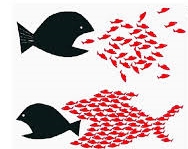 Government must be limited because the relationship between itself and the citizen is reciprocal. While the citizen is obligated to obey legitimate laws, the government is obligated to respect the rights of the citizen.
Government must be limited because the relationship between itself and the citizen is reciprocal. While the citizen is obligated to obey legitimate laws, the government is obligated to respect the rights of the citizen.Sovereignty is located not with the government but with the people. the social contract create sovereignty, not the political contract. We require a Social Contract to take us beyond the state of nature.
Justification of Revolution: If the government should violate its trust by using illegitimate force, it is in violation of the social contract, and the people have the right to revolt. Revolution is not caused by a peoples violent disposition. The people are essentially conservative. Revolution is brought about by the governments violation of the people’s trust. It is the social, not the political contract which provides order and peace.
Property: Though the earth, and all inferior creatures, be common to all men, yet every man has a property in his own person; this no body has any right to but himself. The labour of his body, and the work of his hands, we may say, are properly his. For this labour being the unquestionable property of the labourer, no man but he can have a right to what that is once joined to, at least where there is enough, and as good, left in common for others. Everyone owns themselves – and their labour. When human beings add their labour to Nature, they transform it to private property.